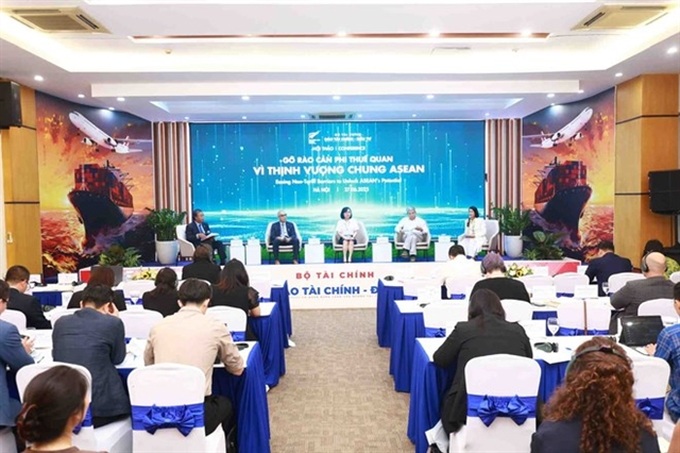
A panel discussion at the workshop 'Easing Non-Tariff Barriers to unlock ASEAN’s potential'. — Photo courtesy of VIR
This was the key message at the ‘Easing Non-Tariff Barriers to unlock ASEAN’s potential’ workshop held on June 27, co-organised by the Vietnam Investment Review and the New Zealand Embassy.
Opening the event, Le Trong Minh, Deputy Editor-in-Chief of Vietnam Investment Review, said that while ASEAN has removed over 99 percent of intra-bloc tariffs, non-tariff barriers (NTBs) remain major impediments to trade and investment.
“In light of ASEAN’s 2045 vision to enhance economic connectivity and promote digital trade, addressing NTBs is a pressing priority,” he noted.
A World Bank report identifies nine main types of NTBs, with sanitary and phytosanitary measures (SPS) and technical barriers to trade (TBT) accounting for a significant share. While designed to protect public health and the environment, these measures can act as opaque hurdles when they lack clarity or consistency.
“For small and medium-sized enterprises, compliance costs such as product re-inspection, unclear technical standards, halal certification or fragmented digital customs procedures are considerable,” Minh said. “NTBs can account for 2 to 4 percent of the value of goods. Cutting just 10 percent of these costs could boost ASEAN trade by 3 to 4 percent, equivalent to tens of billions of USD.”
Nguyen Anh Dung, Country Director of NielsenIQ for Vietnam, the Philippines and Myanmar, cited three key challenges: differing national standards, fragmented logistics systems, and diverse consumer cultures.
“For example, a cosmetic product approved in Thailand may be rejected in Vietnam if it lacks a secondary label or if its ingredient list is not updated,” he said. “Halal certification for food products in Malaysia or Indonesia is complex, costly and time-consuming.”
Dung also noted the difficulties in reaching customers outside major cities due to weak distribution infrastructure and the absence of strong local partners.
“To navigate these barriers, businesses must understand both regulatory frameworks and market dynamics. Analysing local purchasing behaviour and consumer trends can help firms prioritise the right products and partners,” he added.
Le Hang, Deputy General Secretary of the Vietnam Association of Seafood Exporters and Producers (VASEP), described NTBs as a major hurdle for exporters, especially in the form of SPS and TBT regulations and licensing requirements.
“ASEAN countries impose strict rules on quarantine, certification and food safety. Small firms often struggle to meet these demands, such as conducting lab tests or adapting production lines,” Hang said.
VASEP has supported exporters by liaising with authorities, offering training on traceability and ESG practices, and helping develop raw material sources. Many of the group’s recommendations have been adopted by the government, contributing to the easing of some trade bottlenecks.
The workshop served as a platform for businesses to share their experiences with NTBs, explore policy solutions, and strengthen regional cooperation. It also provided tools and strategies to help firms adapt to global trade shifts and enhance long-term competitiveness in Southeast Asia.
